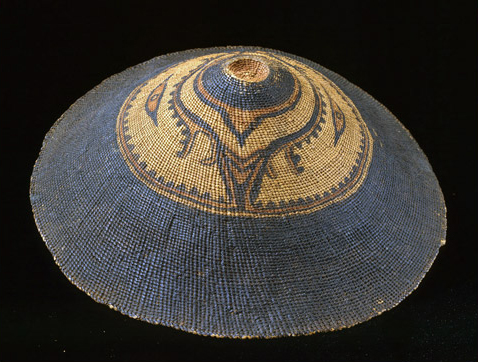Two Clatsop women deliver woven hats previously ordered by the captains, and they distribute them among the enlisted men. The eulachon run begins, and Lewis describes pronghorns and bighorn sheep.
Hats for Lewis and Clark
by Yellowstone Public Radio[1]Originally aired weekdays by Yellowstone Public Radio during the Bicentennial observance of 2003-2006. Narrated by Hal Hansen. Scripts by Whit Hansen and Ed Jacobson. Produced by Leni Holliman. © … Continue reading
New Rain Hats
We were visited today by two Clatsop women and two boys who brought a parsel of excellent hats made of Cedar bark and ornamented with beargrass. two of these hats had been made by measures which Capt Clark and myself had given one of the women some time since with a request to make each of us a hat; they fit us very well, and are in the form we desired them. we purchased all their hats and distributed them among the party.
—Meriwether Lewis
The Eulachon Run Begins
Drewyer accompanied them in their canoe in order to get the dogs which the Clatsops have agreed to give us in payment for the Elk they stole from us some weeks since. these women informed us that the small fish began to run which we suppose to be herring from their discription.
—Meriwether Lewis
Fort Clatsop Illnesses
our sick consisting of Gibson, Bratton, Sergt. Ordway, Willard and McNeal are all on the recovery. we have not had as may sick at any one time since we left Wood River. the general complaint seams to be bad colds and fevers, something I beleive of the influenza.
—Meriwether Lewis
Pronghorn Antelope
The Antelope is found in the great plains of Columbia and are the same of those on the Missouri found in every part of that untimbered country. they are by no means as plenty on this side of the Rocky Mountains as on the other. the natives here make robes of their skins dressed with the hair on them. when the salmon begin to decline in the latter end of the sunme and Autumn the natves leave the river, at least a majority and remove to the plains at some distance for the purpose of hunting the Antelope. they pursue them on horse back and shoot them with their arrows.
—Meriwether Lewis
Bighorn Sheep
The sheep is found in various parts of the Rocky mountains, but most commonly in those parts which are timbered and steep. they are also found in greater abundance on the Chain of mountains wich form the commencement of the woody country on this coast and which pass the Columbia between the great falls and rapids we have never met with this anamal ourselves but have seen many of their skins in possession of the natives dressed with the wooll on them and also seen the blankets which they manufacture of the wooll of this sheep.
—Meriwether Lewis
Weather Diary
aspect of the weather at rise
Wind at rise
aspect of the weather at 4 OC1 P.M. Wind at 4 O’Clock P.M. fair after rain N E cloudy after fair N E the wind scarcely perceptable
—Meriwether Lewis[2]To assist the reader, the editor of this web page has omitted the “Day of ye Month” column and spelled out some abbreviations.
Experience the Lewis and Clark Trail
The Lewis and Clark Trail Experience—our sister site at lewisandclark.travel—connects the world to people and places on the Lewis and Clark Trail.
Plan a trip related to February 22, 1806:

Fort Clatsop is a High Potential Historic Site along the Lewis and Clark National Historic Trail managed by the U.S. National Park Service. The site is managed by the Lewis and Clark National and State Historic Parks.
Notes
| ↑1 | Originally aired weekdays by Yellowstone Public Radio during the Bicentennial observance of 2003-2006. Narrated by Hal Hansen. Scripts by Whit Hansen and Ed Jacobson. Produced by Leni Holliman. © 2003 by Yellowstone Public Radio. |
|---|---|
| ↑2 | To assist the reader, the editor of this web page has omitted the “Day of ye Month” column and spelled out some abbreviations. |





